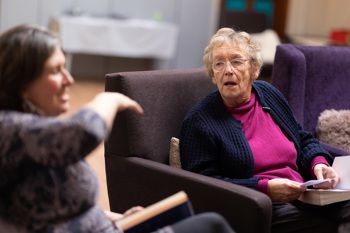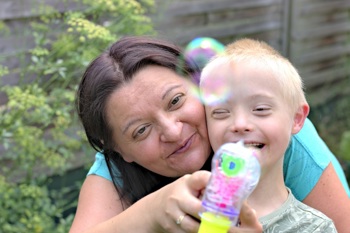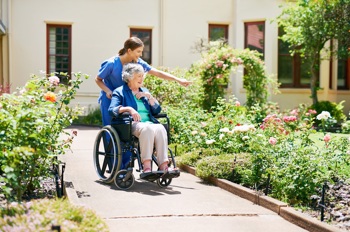
Adapting to diverse care needs – Why is it important?
Adapting to different care needs is crucial in social care for several reasons:
1. Improved Wellbeing
Every person has unique needs, preferences, and circumstances. Adapting care to these individual requirements ensures that each person receives the support that best suits them.
This tailored approach can improve overall wellbeing, enhance quality of life, and contribute to more positive outcomes in both physical and mental health.
2. Effective Treatment and Support
Different conditions and situations require different types of interventions. For example, someone with a chronic illness may need specific medical management, while another person may require support with daily living activities or mental health challenges.
Adapting care ensures that interventions are relevant and effective for the specific individual.
3. Respect for Autonomy and Preferences
Respecting and adapting to individual preferences helps maintain a person’s dignity and autonomy.
When care is aligned with an individual's values, choices, and lifestyle, it fosters a sense of respect and empowerment, allowing people to remain as independent and involved in their care as possible.
4. Enhancing Engagement and Compliance
When care is tailored to fit individual needs, people are more likely to engage with and comply with their person-centred care plans.
This personalised approach helps build trust and encourages active participation, which can lead to better adherence to treatment and overall improvements in health outcomes.
5. Cultural Sensitivity and Inclusion
Individuals come from diverse cultural backgrounds, each with its own set of beliefs, practices, and needs. Adapting care to respect and incorporate these cultural differences ensures that services are inclusive and equitable. This cultural sensitivity can improve relationships between care providers and service users, fostering a more supportive and understanding environment.
6. Optimises Resource Use
Adapting care to meet specific needs can lead to more efficient use of resources. By focusing on the most relevant and effective interventions, care providers can avoid unnecessary treatments or services, ensuring that resources are allocated where they are most needed and can make the greatest impact.
7. Improving Outcomes and Satisfaction
Personalised care plans that align with individual needs and preferences are likely to lead to better health outcomes and higher satisfaction.
People who receive care tailored to their specific situation are more likely to experience positive results, such as improved health, greater comfort, and enhanced overall satisfaction with their care.
8. Addresses Complex Needs
Many individuals have complex, multifaceted needs that cannot be addressed with a one-size-fits-all approach.
Adapting care allows for a comprehensive, holistic approach that can better address these complexities, ensuring that all aspects of a person’s needs are considered and managed effectively. As a result, both hospital admissions and readmissions can be prevented which in turn also reduce hospital discharge delays as there will less dependency on the NHS.

Types of diverse care needs
In social care, the types of diverse care needs are varied and multifaceted, reflecting the complexity and individuality of each person’s circumstances. Here are some key categories:
1. Physical Health Needs
· Chronic Illnesses: Conditions such as diabetes, heart disease, or chronic respiratory conditions require ongoing management and specialized care.
· Mobility Issues: Individuals with mobility challenges may need physical assistance, adaptive equipment, or modifications to their living environment.
· Acute Health Conditions: Short-term but intense needs due to surgeries, injuries, or illnesses.
2. Mental Health Needs
· Mental Illnesses: Conditions such as depression, anxiety, bipolar disorder, or schizophrenia require tailored psychological and psychiatric support.
· Cognitive Impairments: Dementia, Alzheimer’s disease, and other cognitive disorders necessitate specialized care to support memory, cognition, and daily functioning.
· Behavioural Health: Individuals might need support for behavioural issues or substance abuse problems.
3. Developmental and Intellectual Disabilities
· Learning Disabilities: Conditions such as autism spectrum disorders or other developmental delays require tailored educational and developmental support.
· Intellectual Disabilities: Individuals with intellectual disabilities need assistance with daily living skills and may benefit from specialized programs.
4. Sensory Impairments
· Vision Impairments: Individuals who are blind or have low vision may need assistive technologies, orientation and mobility training, and modified environments.
· Hearing Impairments: Those who are deaf or hard of hearing might require hearing aids, communication devices, or sign language interpreters.
5. Cultural and Linguistic Needs
· Language Barriers: Non-native speakers may need translation services or bilingual care providers.
· Cultural Practices: Adhering to specific cultural or religious practices might be important for some individuals, influencing dietary preferences, dress codes, or daily routines.
6. Age-Related Needs
· Adapting to ageing population: Older adults may have unique needs related to aging, such as assistance with daily activities, management of age-related health conditions, or support for maintaining independence.
· Paediatric Care: Children and adolescents have distinct developmental needs and may require specialized paediatric care.
7. Family and Caregiver Needs
· Support for Caregivers: Family members or informal caregivers may need training, respite care, or support services to manage their caregiving responsibilities effectively.
8. Legal and Ethical Considerations
· Advance Directives: Respecting and incorporating individuals’ advance directives or living wills into their care plan.
· Autonomy and Decision-Making: Ensuring that individuals have a say in their care and making decisions that reflect their wishes and rights.

Adapting care pathways to individual needs – how do care needs change?
Adapting care pathways to individual needs is essential for delivering effective and personalised care, as people’s needs evolve over time due to changes in health, life stages, and personal circumstances. Understanding how these needs change is key to maintaining relevant and effective care.
Life stage transitions significantly impact care requirements. In paediatric care, needs shift from developmental milestones in childhood to educational and mental health support in adolescence. As individuals move into adulthood and old age, they often face declines in physical health, cognitive functions, or mobility. Elderly care, for instance, may involve managing chronic conditions, providing mobility aids, or addressing end-of-life issues. Each of these stages requires tailored adjustments so transitions from one type of service to another is seamless enabling all care pathways to meet evolving needs.
Health conditions themselves can also change over time. An acute condition, such as a serious injury or illness, might initially require intensive medical intervention but could transition to long-term management and rehabilitation. Chronic conditions like diabetes or heart disease often progress, necessitating regular updates to treatment plans, medications, and lifestyle modifications to manage symptoms effectively.
Functional abilities, whether physical or cognitive, influence care requirements as well. For example, someone recovering from surgery may initially need extensive rehabilitation and reablement services but gradually shift to less intensive support as their mobility improves.
Individuals with cognitive decline, such as those with dementia, may require increasingly comprehensive care to assist with daily activities and cognitive stimulation as their condition progresses.
Mental and emotional health needs can fluctuate as well. Individuals may experience periods of stability or crisis, requiring care pathways to adapt accordingly. During times of emotional or mental health crises, intensive support might be needed, while stable periods may focus on maintaining support and counselling. Changes in life circumstances, such as experiencing significant stress or loss, can also impact emotional health, necessitating additional support and resources.
Personal preferences and lifestyle choices also affect care pathways. As individuals’ preferences evolve, including dietary choices or hobbies, these should be incorporated into their care plans. Those seeking greater independence may require adjustments in care to support self-management.
Adapting care pathways therefore requires ongoing assessment and flexibility to address the dynamic nature of individual needs. By understanding and responding to changes in health, life stages, and personal preferences, care providers can ensure that interventions remain effective and supportive.

What are the challenges of adapting to diverse care needs?
Adapting to diverse care needs in social care presents several challenges, reflecting the complexity and variability when providing personalised care.
1. Managing and catering personalised care
One of the primary challenges is developing and maintaining individualised care plans that address the unique needs of each person. This involves thorough assessments and ongoing adjustments as needs evolve, which can be resource-intensive and complex. Ensuring that care plans are both comprehensive and flexible requires careful balancing of resources and priorities.
2. Resource Constraints
Limited resources, including financial, staffing, and technological constraints, can impact the ability to adapt care effectively. For instance, not all care settings have access to advanced technologies or enough staff to provide personalised care, which can hinder the ability to meet diverse needs adequately.
3. Training and Skill Development
Care providers must be well-trained to handle a wide range of conditions and needs. This requires continuous education and skill development, which can be challenging to implement consistently. Keeping staff updated on the latest best practices, technologies, and cultural competencies is essential but can be resource intensive.
4. Coordination of Care
Adapting care pathways often involves coordinating multiple services and professionals, including doctors, therapists, social workers, and caregivers. Effective communication and collaboration among these different entities are crucial but can be challenging to achieve, especially in complex cases or fragmented care systems.
5. Navigating Complex Needs
Some individuals have multiple, intersecting needs—such as a combination of physical, mental, and social challenges—that require a multi-faceted approach. Addressing these complex needs effectively requires a high level of expertise and coordination, which can be difficult to manage.
6. Evolving Needs
Care needs are not static; they can change rapidly due to health status, life circumstances, or personal preferences. Keeping care plans up-to-date and responsive to these changes requires continuous monitoring and flexibility, which can be demanding for care providers.
Adapting to diverse care needs involves navigating a range of challenges, including individualisation of care plans, resource constraints, and the need for ongoing training. Effective adaptation requires balancing personalised approaches with standardised protocols and coordinating across multiple services. Despite these challenges, overcoming them is essential for delivering high-quality, responsive care that meets the unique needs of each individual.

Best ways to adapt care to meet diverse needs
Adapting care to meet diverse needs effectively requires a multifaceted approach that integrates personalised strategies and innovative solutions. Investing in technology enabled care can significantly enhance this process.
Investing in technology enabled care offers numerous benefits to make it easier to adapt to diverse needs. For example, it provides the opportunity to implement flexible care models that can adapt to changes in an individual’s condition.
At Access Technology Enabled Care (Access TEC) we help to transform care deliveries from reactive to proactive care models. By combining both traditional reactive alarm functionality and digital monitoring we can learn the daily behaviours of an individual in a matter of 14 days. Here the wider care circle can be notified of changes in activity before something more critical happens.
Personalised smart alerts can be set up to the cater to indicate a change which may impact individual care needs, giving the flexibility to adapt as care needs change. We also go one step further across our Access TEC ecosystem by offering support both inside and outside the home through our wearable technology so individuals can increase their independence with the confidence support will be there if needed. As a result, timely support can be delivered with care plans adjusted accordingly by making better data-led decisions.
Here we take data and turn them into actionable insights to provide reassurance whilst delaying future care needs.
Camden Council, for example, found that by investing in Access TEC they were able to discharge patients up to three days earlier reducing discharge delays as well as preventing readmissions to the hospital.
The power of technology of care therefore helps revolutionise how to adapt to diverse and ever-changing care needs for the better. For more information on how best to implement technology enabled care in social care download our latest guide today.
Summarising how to adapt care deliveries and pathways to diverse care needs
This article has explained that adapting care deliveries to meet diverse needs is crucial for delivering effective, person-centred care, especially in a rapidly ageing population where health and care requirement continually evolve.
As care needs change, social care providers must adopt flexible, strategic approaches to ensure that individuals receive the appropriate support to maintain their independence and wellbeing.
In conclusion, adapting care to meet diverse needs is crucial for delivering effective, person-centered care, that not only supports the individual but the wider care circle too. By addressing the challenges of limited resources, coordination complexities, and the need for ongoing training, this article has shown the importance of investing technology to help improve care outcomes.
Investing in Access TEC can offer a transformative solution allowing social care providers to deliver better outcomes-focused care that is more responsive to individual changing needs. Through using data-driven insights, Access TEC makes it easier to create and adapt care plans as needs change to deliver better proactive care both in an individual's homes and outside their home whilst enhancing communication and coordination within the wider care circle.
As a result, social care providers can deliver higher quality responsive care that is both efficient and effective to increase independence.
For more insights and guidance on the best ways to implement technology enabled care in your local area, contact us today.

